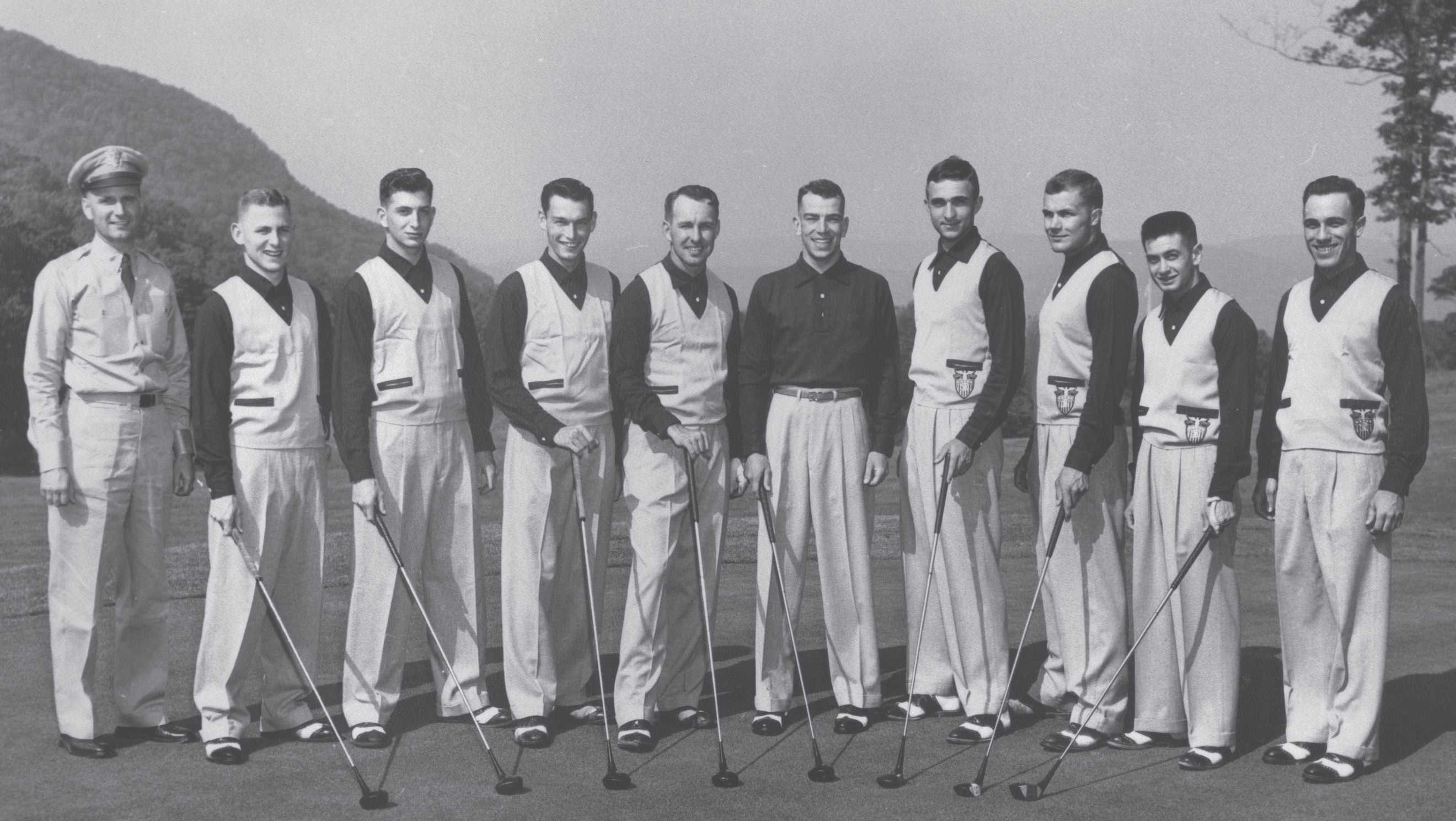|
Raymond Frederick Allen, Jr.
was born
to
Raymond F. Allen, Sr. and Mildred C. Allen in Albany, NY on Oct 6, 1931 but soon
moved with his parents to Rochester, NY, where he was raised along with his
brother, Donald C., and his sister, Elizabeth Anne. In his high school years,
Ray earned a glowing reputation in school and sports. In golf, he qualified for
the National Amateur Championship while in high school in 1949. During his
junior and senior years, Ray attended Manlius Military Academy and decided upon
West Point as his goal. On graduation from Manlius, Ray entered as a new cadet
in the summer of 1950.
Ray's personality and desire made him
perfect for the Academy. He had an infectious
spirit and a positive “can-do” attitude. He continued his magnificent golf
performance on the West Point Golf Squad, where he starred all four years. He
earned Minor As during his cow and First Class years. In addition, he won a
coveted "Navy Star” during his cow year for beating his opponent and helping his
team win the match with Navy. As a First Classman, he was elected captain of the
team and on Apr 26, 1954 established a new amateur record for the West Point
Gold Course: 68, which is five under par. LTC Francis J. Robert, the officer
representative for the golf team in 1954, sent a letter to Ray’s
Tactical Officer for Company H-1: "This
newly established record by Cadet Allen is one of the most outstanding athletic
achievements ever performed by a cadet. He is deserving of special commendation.”
Ray earned the nickname
“Chippie”
because of his perennial “happy spirits”
after
a long night of studying, and it fit because of
his golf prowess and leadership.

During his cow year, Ray met Helen Patricia Robinson, a beautiful
young woman from Albion, NY, and began a serious relationship that culminated in
their marriage after graduation. Ray was determined to be an Infantry leader and
believed that his leadership could best be experienced as an Airborne Infantry
commander. In late 1954 and early 1955, he completed the Basic Infantry Officers
Course at Ft. Benning, GA, and then both Ranger and Airborne Schools. He then
reported to the 11th Airborne Division at Ft. Campbell. In July 1955, he married
Pat Robinson, and they began their lives together exactly where he wanted to be:
assigned to the 2nd Battalion, 188th Parachute Infantry Regiment, as a platoon
leader. Ray was selected by his commander to attend the Jungle Warfare School in
Panama, where he was awarded the Jungle Expert Patch for excellence in small
unit leadership. In the summer of 1955, the 11th Airborne Division was selected
to be the lead element in the Army’s “Operation Gyroscope," designed to transfer
the entire division from Ft. Campbell to Germany. Ray and Pat were sent with the
188th to Augsburg, Germany in early 1956. In the summer of 1956, Pat contracted
a severe case of uterine cancer and was rushed back to the United States and
Walter Reed Army Hospital for extensive treatment. Ray accompanied her, and in
August 1956 he was reassigned to the 101st Airborne Division at Ft. Campbell.
Ray stayed by her bedside at Walter Reed day and night through four months of
very painful treatments, but Pat did not survive. She passed on Nov 7, 1956.
Ray's world was shattered, and this proved to be the seminal event that caused
his personal illness and eventual separation from the military service that he
loved.
A year later, Ray was reassigned to the 3rd Infantry Division in Korea and
stationed near the Demilitarized Zone. His personal devastation continued, and
he suffered a nervous breakdown. Returned to Walter Reed Army Hospital for
extended treatment in early 1958, he spent five years undergoing periodic
treatment. Finally, he was honorably discharged in 1964 with a 75% disability.
That ended the very promising military career of a magnificent leader. It is a
personal tragedy that he was not able to recover from the mental anguish of his
wife’s passing. After his separation in 1964, Ray returned to his family in
Rochester and attempted to adjust. At this time his brother, Donald Allen, seven
years his junior, helped Ray in every possible way. Ray tried to tackle civilian
pursuits, but he was an action person and did not take to paperwork jobs. Ray
volunteered for and completed several tasks to assist other friends and agencies
with projects within the community of Brighton. This lasted for about 30 years,
but gradually Ray slipped into more depression and finally passed in his sleep
on Nov 3, 2004.
Ray was admired by his classmates and friends. LT James Allison, one of Ray's
colleagues in the 188th Parachute Infantry Regiment, said of him, “Ray was an
excellent Army officer; always remaining calm and steady—just as he did on the
golf course. He was a great example to those who served with him, those who led
him, and those who served under him.” Ray dedicated his life to his country and
was always ready to help others. Grip Hands.
—Bob Elton ’54 and Don Allen, brother
|
